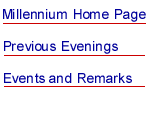

On Tuesday, October 12, 1999, the President and
First Lady hosted the eighth Millennium Evening at the
White House.
The question behind the eighth Millennium Evening at the White House was: if we were looking back from the year 2030, what changes occurring now will have most affected our lives by then? Two major developments that stand out in response to that question are the fields of information technology and genetic research. Spurred by the computer chip and rapidly expanding computing capacity, information technology already has revolutionized aspects of our lives from the work place to personal communications. The impact of technology ripples through every major industry and endeavor and will only grow in reach and interactive ability. The ever-increasing computer capacity has made the mapping of the human genome possible. The Human Genome Project will soon identify all the estimated 100,000 genes in human DNA and determine the sequences of the 3 billion chemical bases that make up that DNA. That information will serve as the foundation for health care applications both to cure and prevent diseases. What will we humans do with this knowledge about our own natural information system? How will the two technologies continue to interact and influence each other? The possibilities are full of advantages and challenges that will most often be defined and answered by all of us as we make choices in our everyday lives.
Two presenters initiated a discussion that brought us up to date in the two fields and pointed us toward the future. Dr. Vinton Cerf is known as a "Father of the Internet" for his work with the U.S. Department of Defense’s Advanced Research Projects Agency (DARPA) where he played a key role in the development of Internet and Internet-related data packet and security technologies. He currently serves as senior vice president of Internet Architecture and Technology for MCI WorldCom. In December 1997, he was awarded the U.S. Medal of Technology by President Clinton.
Dr. Eric Lander is Director of the Whitehead Institute/MIT Center for Genome Research. He and his research group have developed many of the tools of modern genome research -- including genomic maps of the human mouse and rat genomes in connection with the Human Genome Project and techniques for the genetic analyses of complex, multi-gene traits. He has applied these techniques to the understanding of cancer, diabetes, hypertension, renal failure and dwarfism. Dr. Lander was awarded a Rhodes Scholarship in 1978 and received the MacArthur Foundation Prize Fellowship in 1987 for his work in genetics.
The Millennium Evening at the White House is co-sponsored by the National Endowment for the Humanities with major support from Sun Microsystems.
For more information on informatics and genomics, follow these links. To suggest a link, send the URL via email to: millennium@whitehouse.gov.
To comment on this service,
send feedback to the Web Development Team.
![[White House icon]](home_pin.gif)
![[Help Desk icon]](help_pin.gif)